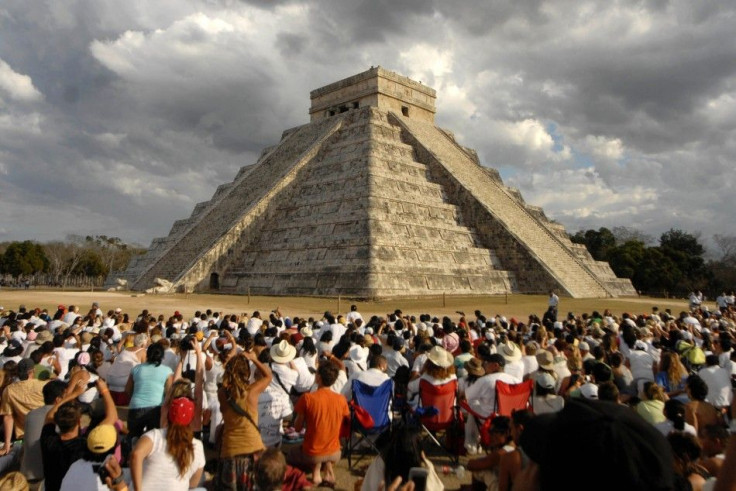Mayan Calendar 2012: How To Brand An ‘Apocalypse’ You Know Won’t Happen

Have you heard? The Mayan calendar (when interpreted right) predicts (if you ask the right person) that the word will end on Friday (“this is not a hoax”).
Word is spreading fast: Police have detained 500 doomsday believers in China for spreading rumors of imminent apocalypse. Rampant suicides in Russia forced Moscow’s top psychiatrist to support reforms imposing a limit on “negative information” available in the media, beginning with apocalypse rumors. The tiny town of Bugarach, France, is overrun with New Age fanatics who believe a nearby mountaintop will open up on Dec. 21 and aliens will emerge with spaceships to save all humans nearby.
Is this really what the Mayan calendar foretells? If so, the Maya certainly had a cheeky sense of humor.
Fueled by a few words from an American scholar and a handpicked interpretation of a crumbling monument at the Tortuguero archaeological site in Tabasco, Mexico, thousands of people across the world banded together on the Internet to codify a message of impending doom. Add a Hollywood movie, an abundance of 2012 books and our penchant for mythmaking, and you’d be forgiven for thinking that the world might actually end this week. But why are there no reports of any doomsday prophets or apocalypse “scholars” flocking to southern Mexico or Guatemala, the cradle of the Maya civilization. Why haven’t the Maya themselves -- who, despite popular belief, are far from an extinct race -- risen up to warn the world? Are they hiding something from us?
Quite the contrary, said Rodolfo López Negrete Coppel, COO and undersecretary of the Mexico Tourism Board. There will be an end of an era, he said, but there will also be a new beginning. Like any calendar, it’s cyclical.
“This new era is predicted to be full of prosperity, economic growth and peace,” he told IBTimes in September. “That is our interpretation, and the reaction to that has been very positive.”
And why wouldn’t it be? In the five Mexican states covered under the nation’s Mundo Maya campaign, López Negrete Coppel expects a full season with the biggest visitor numbers Mexico has ever seen.
Then-President Felipe Calderon boldly proclaimed in July that the nation would attract 52 million tourists (domestic and international) to southeastern Mexico for the “Year of the Maya.” To reach that goal, Mexican officials have had to walk a fine line of endorsing the end of the Mayan calendar while hinting at the end of the world paranoia and simultaneously denying that it will happen.
“There are some people who take this very seriously,” López Negrete Coppel agreed, “but we do not anticipate any acts of violence or any type of fanatic overreacting.”
Brendon O'Brien of the Albuquerque, N.M.-based Maya Sites Travel Services said “the hoopla is media-fabricated and our clients know better.”
“Mayanists are generally smart … a cut above the average bear,” he quipped. “We have been doing tours to the Maya regions for 12 years and never had a ‘kook’ or fanatic on our tours that I know of. We have had no one express any concerns about being in a foreign country on those dates or some end-of-the- world scenario.”
The Maya civilization reached its peak between 250 and 900 A.D. and was fascinated by mathematics, astronomy and the cycles of time. Its Long Count calendar began in 3114 B.C. and moves forward in 394-year periods known as bak’tuns. The winter solstice in 2012 marks the completion of the 13th bak’tun.
“The Maya religion is about keeping count of the days, and the Maya elders have shared with me that there are no predictions of strange things, but there will be a shift in the consciousness of humanity,” said Carla Molina, president of Guatemala City-based Ecotourism & Adventure Specialists.
The ceremonies on Dec. 21 will signal a change from the corn people to the men of honey, who are in harmony with nature and, like bees, only take from it what they need, according to legend. Molina said the activities in Guatemala will be more like a church service than a doomsday blowout.
Yet, despite all evidence to the contrary, many people are itching for an apocalypse. A recent Ipsos poll of more than 16,000 adults from 21 countries shows that doomsday theorists are not such a small minority after all. Ten percent of those surveyed believed the “Mayan prophecy is true,” while 8 percent believed the “world will end in 2012.” One in seven global citizens believed the end of the world was coming in their lifetime. The survey indicates that the idea has certainly bored its way into society’s psyche, and that a small but dedicated group of people believe they’re privy to a warning about the future beyond Dec. 21, 2012.
But perhaps Dec. 22 will be an even bigger day. At least then we can all look back, laugh and learn.
© Copyright IBTimes 2024. All rights reserved.






















